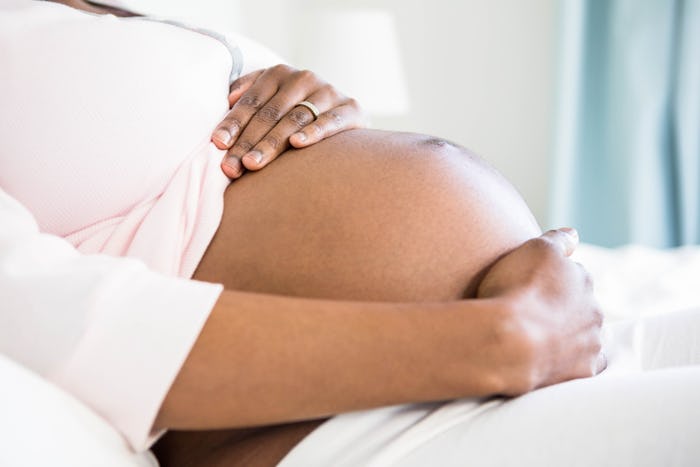Life
Black Women Are 300 Percent More Likely To Die From Pregnancy & Birth Than White Women
On Thursday, NPR published a story about Shalon Irving, a lieutenant commander of the Commissioned Corps of the United States Public Health Service. She was an epidemiologist at the Centers for Disease Control and Prevention, where she was committed to "trying to understand how structural inequality, trauma and violence made people sick." But then Irving herself became part of the heartbreaking statistics that depict maternal mortality among black women in the U.S. Black women are 300 percent more likely to die from pregnancy- or childbirth-related causes than white women, according to the CDC. And Irving was unfortunately a victim of that severe disparity.
Irving's death would be sad no matter what, but the fact that her career was so devoted to improving the health of others makes it even more tragic. Rashid Njai, her mentor, told NPR:
She wanted to expose how people's limited health options were leading to poor health outcomes.
So how did Irving become one of the many black mothers to die from childbirth or pregnancy-related complications? NPR set out to explore the reasons behind her death, and information from the CDC makes it very clear that Irving is just the latest in a long line of these deaths that need to be further researched, and the causes remedied, if the U.S. wants to reverse this terrible trend.
To put things into perspective, a black woman is 22 percent more likely to die from heart disease compared to a white woman, and 71 percent more likely to die from cervical cancer, according to ProPublica, which co-published the piece with NPR. That makes the fact that they are 300 percent more likely to die as a result of pregnancy- or childbirth-related causes even more eye-opening.
Though it clearly discriminates based on race, the maternal mortality rate for black women doesn't change for higher income brackets or educational backgrounds. A 2016 analysis of maternal mortality cases in New York City revealed that college-educated black mothers were more likely to experience severe complications from pregnancy and childbirth compared to white women without high school diplomas, Colorlines noted.
And Irving was one of those women. She had a B.A. in sociology, two master's degrees, and a dual-subject Ph.D., NPR reported. Not to mention, she also had great health insurance and a "rock-solid support system." But she still died as a result of complications of high blood pressure. So, what happened?
Experts like social scientists and medical researchers feel that this problem is really about the racism that women of color face. Systemic problems such as restricted access for black people to healthy food or clean drinking water, to safe neighborhoods as well as good schools, and to decent jobs and reliable transportation may be partly to blame, ProPublica reported. In addition, black women are more likely to be uninsured when they aren't pregnant, so they sometimes start prenatal care later and, if they did manage to get insurance during pregnancy, they often lose coverage after they give birth.
Black women are also more likely to have chronic health conditions such as hypertension, obesity, and diabetes, according to Current Cardiovascular Risk Reports and other published studies, and those conditions can make having a baby more hazardous to their health. But black women are more likely to have these health concerns often as a result of the aforementioned, systemic issues. A lifetime of inadequate access to social support systems that white people often have can take a toll — it's all interconnected, and it's nothing new.
Plus, data shows that black individuals get health care "in a concentrated set of hospitals" that appear to provide lower quality of care, according to an article in the American Journal of Obstetrics & Gynecology.
In other words, it's not always about economics and access. The problem may lie in unconscious biases in health care, which can impact the quality of care a black mother receives or the attention they may get from their doctors as compared to white women. Raegan McDonald-Mosley, the chief medical director for Planned Parenthood Federation of America, who knew Irving, told NPR:
...you can't educate your way out of this problem. You can't health care-access your way out of this problem. There's something inherently wrong with the system that's not valuing the lives of black women equally to white women.
Of course, the exact cause of each maternal death differs. But the CDC provides data that makes it extremely clear that black women are disproportionately affected when it comes to pregnancy-related mortality in the U.S. For example, from 2011–2013, pregnancy-related death ratios were as follows in this country:
- 12.7 deaths per 100,000 live births for white women
- 43.5 deaths per 100,000 live births for black women
- 14.4 deaths per 100,000 live births for women of other races
The numbers don't lie. Black mothers giving birth in the U.S., in this day and age, die at three to four times the rate of white mothers. And more needs to be done to research and rectify the problem — for Shalon Irving, and countless other women like her.
